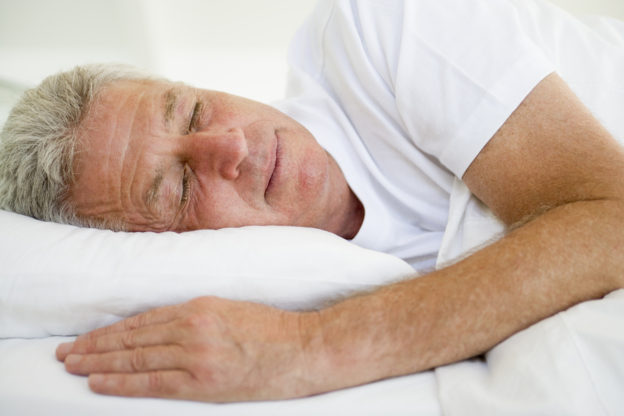By David Blyweiss, M.D., Advanced Natural Wellness
February 25, 2019
When T.B. stopped into my office a few months ago he looked like crap.
The bags under his eyes were large enough to qualify for a baggage fee on his next airline flight. His skin was pasty. And he didn’t have the usual “larger than life” attitude he normally displays.
The poor guy wasn’t sleeping well. He kept getting headaches. During the day fatigue and a lack of concentration plagued him.
T.B. had no idea what was wrong with him. But after an extremely in-depth discussion, I was pretty sure that I did.
I suspected T.B. was suffering from sleep apnea.
Unlike many patients, when I recommended that he spend a night in a local sleep lab, he readily agreed. He was desperate.
MD Exposes the Hidden Danger to Your Eyes

When your eyesight starts to fail, it's a real problem. Suddenly you can't go to the grocery store... you can't get to the doctor if you have an emergency... you can't meet your friends for dinner…
Your "regular" doctor doesn't have time to keep up with the latest research. And the same goes for eye doctors. They go to school to learn how to fit you for glasses and contacts, but have no way of preventing the damage and loss of eyesight that threatens your freedom and independence.
Let me show you something that explains a LOT about how your eyes work.
In my FREE Special Report, I'll show you a HUGE, untapped resource for your eyes that safely and naturally restores clear, effortless eyesight.
Click here to get started...
Well it turns out I was right about the sleep apnea. And it didn’t take any time at all to get him set up with a CPAP machine to use at home while he sleeps.
But it didn’t start off very well.
T.B. told me he actually felt better after using it. But the mask was uncomfortable. He kept waking up during the night to pull it off. In a matter of days he stopped using it… and then he didn’t feel better anymore. He felt worse.
This is an extremely common response to CPAP. (And I suspect it’s why so many patients refuse to go to a sleep clinic to start with. Nobody wants to sleep with a weird contraption strapped to their face!)
So we worked together to find a better fitting mask. T.B. also found a pillow that was especially designed for CPAP users and ordered it online.
Do you want to guess about what happened next?
He slept like a baby.
And when T.B. popped into my office a few days ago he was back to his wholesome, energetic and swaggering self.
“I have never slept so well!” exclaimed T.B.
The World's Quickest Solution for Ending Prostate and Urinary Misery
This has recently been revealed to be one of the only real breakthroughs in prostate health.
The seeds of a strange fruit (sometimes called "Chinese Apples") hold powerful phytonutrients that are a revolution in prostate health.
In fact, UCLA and Veterans Administration research have now proved this to be true.
Not only that, but it may be the worlds quickest solution for ending prostate misery.
Simply stated, these phytonutrients represent a huge step beyond beta sitosterol, saw palmetto, and other phytosterols alone.
Simply click HERE if you want to have fast prostate relief...restful, uninterrupted sleep...no more constant "urges to go"...enhanced virility...and optimal prostate support for life.
Some of the symptoms of sleep apnea include snoring, waking up gasping for breath (usually told to us by our sleeping partner), morning dry mouth, daytime sleepiness, headache upon wakening and difficulty paying attention during the day.
If you are a loud snorer or experience other signs of sleep apnea, I highly recommend you talk to your doctor about spending a night a sleep clinic.
I can’t stress how important this is.
You see, sleep apnea deprives your heart, brain, lungs and other organs from much-needed oxygen while you sleep. This, in turn, leads to high blood pressure, heart disease, stroke, memory problems, diabetes, obesity and a shorter lifespan.
In other words, a single night in a sleep lab could save your life!
If you receive a sleep apnea diagnosis and are sent home with a CPAP machine, give it a try.
If the mask is uncomfortable, try others like the nasal pillow. If that fails, work with your doctor to obtain one that’s personalized for you… one that’s made directly from a mold of your own face. (These tend to offer more comfort and allow you to move without slippage while sleeping.)
I find that once a patient gets used to their sleep mask, they often end up falling in love with their CPAP the same way T.B. did.
They love the energy… the alertness… the full-of-life feeling they get after a good night’s sleep. Many consider it a “life-saver”, their lifeline to a longer, healthier and more active life.
So if you find yourself with sleep apnea, make sure to give your CPAP an honest chance to make a difference in your life.
I also recommend addressing any underlying issues that may be contributing to your problem.
Lose weight. Apnea patients who drop excess pounds often see marked improvements in their symptoms.
Avoid alcohol before bedtime. Alcohol relaxes the throat muscles involved in snoring and sleep apnea. So it’s a good idea not to indulge before bedtime.
Don’t sleep on your back. Sleeping on your back makes the tongue fall back and worsens sleep apnea. Sleeping on your side or stomach places the neck in a more favorable position for easy breathing.
You can also try some oral exercises to strengthen weak muscles and floppy tissue.
- Place the tip of your tongue on the roof off your mouth. Then, slide your tongue back and forth against it.
- Singing exercises – like repeating “mah, mah, mah”, “kah kah kah”, and “lah lah lah” – are something you can do around the house at any time of the day.
Stick out your tongue and try to reach your chin with the tongue tip. Hold it for a moment, then repeat several times. Try and extend your tongue further every day. Look in the mirror while doing this once or twice…it will make you laugh or at least bring a smile to your face.
SOURCES:
Institute of Medicine (US) Committee on Sleep Medicine and Research; Colten HR, Altevogt BM, editors. Sleep Disorders and Sleep Deprivation: An Unmet Public Health Problem. Washington (DC): National Academies Press (US); 2006. 3, Extent and Health Consequences of Chronic Sleep Loss and Sleep Disorders.
Romero-Corral A, et al. Interactions Between Obesity and Obstructive Sleep Apnea Implications for Treatment. Chest. 2010 Mar; 137(3): 711–719.






